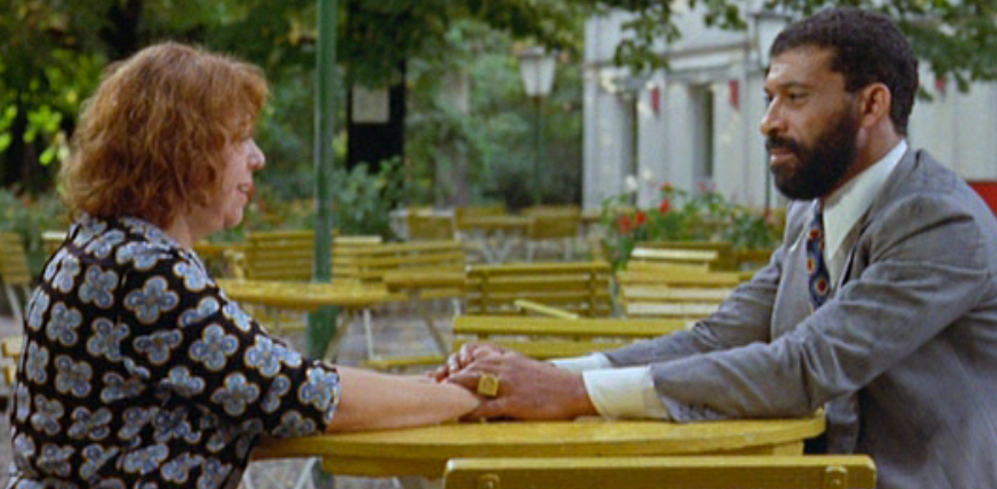
The 1974 film Ali: Fear Eats the Soul directed by Rainer Werner Fassbinder centers around the then controversial relationship that unfolds between Emmi, a middle-aged German woman with grown children, and Ali, a younger immigrant worker from Morocco. Still today, Ali is unsettling largely because of the stares the two protagonists receive from just about everyone they encounter. What was even more troubling to me, though, was Ali's seemingly permanent outsider status throughout the film marked by white Germans repeatedly "othering" him.
In perhaps the most direct attack against Ali, the shopkeeper of a local store refuses to help him find what he was looking for by feigning incomprehension at Ali's German pronunciation. The shopkeeper's act, however, is a thin veil for his racism, and it's particularly disgusting because it is a scene that's not uncommon today in our country. Their interaction highlights both Ali's attempt to integrate himself into German society as well as white Germans' unwillingness to let him in.
Even Emmi in one instant reminds viewers of Ali's outsider status when she tells him she doesn't know how to make couscous and that he needs to learn to live as Germans do if he wants to continue living in that country. Although he doesn't verbalize it, he is clearly hurt by her comment and leaves her apartment to go see the owner of the pub he frequents. This is another hard-hitting scene because of all people, Emmi should be on his side, especially since she now knows what it's like to be seen as the "other".
By the end of the film, the doctor reaffirms once and for all that Ali is an outsider. He remarks that the medical condition that caused Ali's collapse in the pub was typical for immigrant workers and that there was not much he could do to help in the long run because he knew Ali would be back soon. Mayne argues that "the roots of that 'accident' are clearly the material conditions of Ali's existence," which not only encompass his job but also the stress stemming from his perpetual treatment as someone different from those around him (70).
The ending reveals Fassbinder's bleak outlook on the possibility for change in this respect, a perspective that's also clear in his 1978 picture In a Year of 13 Moons. Just like Ali, the director's later film concludes with the protagonist, this time a transgender woman, still unaccepted by the society she lives in. The woman, Elvira, searches for love throughout the narrative much like Ali does, yet she's unable to find it due to other characters' perceptions of fundamental parts of her identity. When we examine the two films together, we see Fassbinder's portrayal of a postwar Germany that's in some ways just as intolerant of diversity as it was during the Nazi regime.



I might even say that another attack on him be when Emmi invites her friends to feel him up. I think that was pretty shocking that they were treating him like an exhibit. I believe seeing someone struggle with a shopkeeper is slightly outdated but definitely still in the circle of happenings especially since there are a lot of learning biases that are now being exposed; I mean what do I truly know. But I think it's hard for us to tell when we are from the US, where racism seems to be more institutionalized. With current events going on and what appears in the media I feel like we are slightly reverting towards a sensory world. Which makes me think about how Fassbinder was ahead of his time creating very out of pocket films that speak to what I might call innovative ideals.
ReplyDeleteI agree with your thought of how Emmi should be on Ali's side since she should understand what it's like to be seen as the "other". I think the reason why she doesn't really defend him is because they never truly loved each other. Their relationship was a product of circumstance with others.
ReplyDeleteI think your last point about postwar Germany's intolerance is really important. Ali:Fear Eats the Soul and In a Year of 13 Moons depict different kinds of intolerance, but both are very harmful. Ali shows outright hostility or subdued resentment. 13 Moons shows Elvira struggling against indifference towards her existence, which people around her ignore until it's too late.
ReplyDeleteI like how you touch on the issue of race in this film and how you connected it to the society we live in today which is very true. I also very much agree with what you mentioned at the end about postwar Germany's intolerance for foreigners and how this attributes to Fassbinder's use of the outsider in his film since Fassbinder felt like an outsider himself in society.
ReplyDeleteI think this movie particularly resonates in an era where we are so much struggling with the issue of immigration. We talk about the cost of immigration to our country but we rarely consider the cost of current xenophobia for the immigrant.I think this film does a really good job of making us feel that outsider position as well as witness it.
ReplyDelete